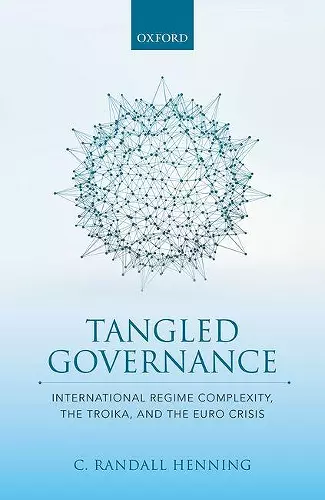Tangled Governance
International Regime Complexity, the Troika, and the Euro Crisis
Format:Hardback
Publisher:Oxford University Press
Published:6th Apr '17
Should be back in stock very soon

Tangled Governance addresses the institutions that were deployed to fight the euro crisis, reestablish financial stability in Europe, and prevent contagion to the rest of the world. Henning explains why European leaders chose to include the International Monetary Fund (IMF) in the crisis response and provides a detailed account of the decisions of the institutions that make up the troika (the European Commission, European Central Bank, and IMF). He examines the institutions negotiating strategies, the outcomes of their interaction, and the effectiveness of their cooperation. The institutional strategies of key member states, including Germany and the United States, are also explored in this study. The book locates its analysis within the framework of regime complexity, involving clusters of overlapping and intersecting regional and multilateral institutions. It tests conjectures in the regime-complexity literature against the seven cases of financial rescues of euro area countries that were stricken by crises between 2010 and 2015. Tangled Governance concludes that states use some institutions to control others, that complexity is the consequence of a strategy to control agency drift. States mediate conflicts among institutions and thereby limit fragmentation of the regime complex and underpin substantive efficacy. In reaching these conclusions, the book also answers several key puzzles, including why Germany and other northern European countries supported IMF inclusion despite its adopting positions opposed to their preferences; why crisis fighting arrangements endured intense conflicts among the institutions; and, finally, why the United States and the IMF promoted further steps to complete the monetary union.
Given Tangled Governance's impressive empirical richness and its very convincing theoretical argument, the book is highly recommendable as a comprehensive account of the complex governance issues of the crisis period and the equally numerous as well as heterogeneous actors and institutions involved. The very well prepared data on the conditions of the country programmes together with its hint towards the important role of the United States of America and the IMF in the European governance regime offers valuable insights for both scholars searching for an inclusive account of the complex politics and governance mechanisms of the period in question, and those scholars interested in EU studies that want to learn more about the complex regime of European multilevel governance from a more international and global governance perspective. * Sebastian Heiderbrecht, JMCS *
This is an innovative and interesting argument, which Henning supports with an excellent array of case studies. More important, Henning's argument adds to our understanding of international regimes in a way that resonates with what we know about domestic politics. * Erik Jones, Survival: Global Politics and Strategy *
Through detailed analysis of more than a half dozen programs undertaken since 2010 to 'rescue' the GIIPS (Greece, Ireland, Italy, Portugal, Spain) this book provides insightful analysis of the crucial roles played by northern European countries like Germany, as well as non-European countries- the United States in particular- in contributing to an increasingly complex set of new regional and international governance institutions. * Malcolm Campbell-Verduyn, Europe Now *
ISBN: 9780198801801
Dimensions: 240mm x 165mm x 26mm
Weight: 654g
316 pages